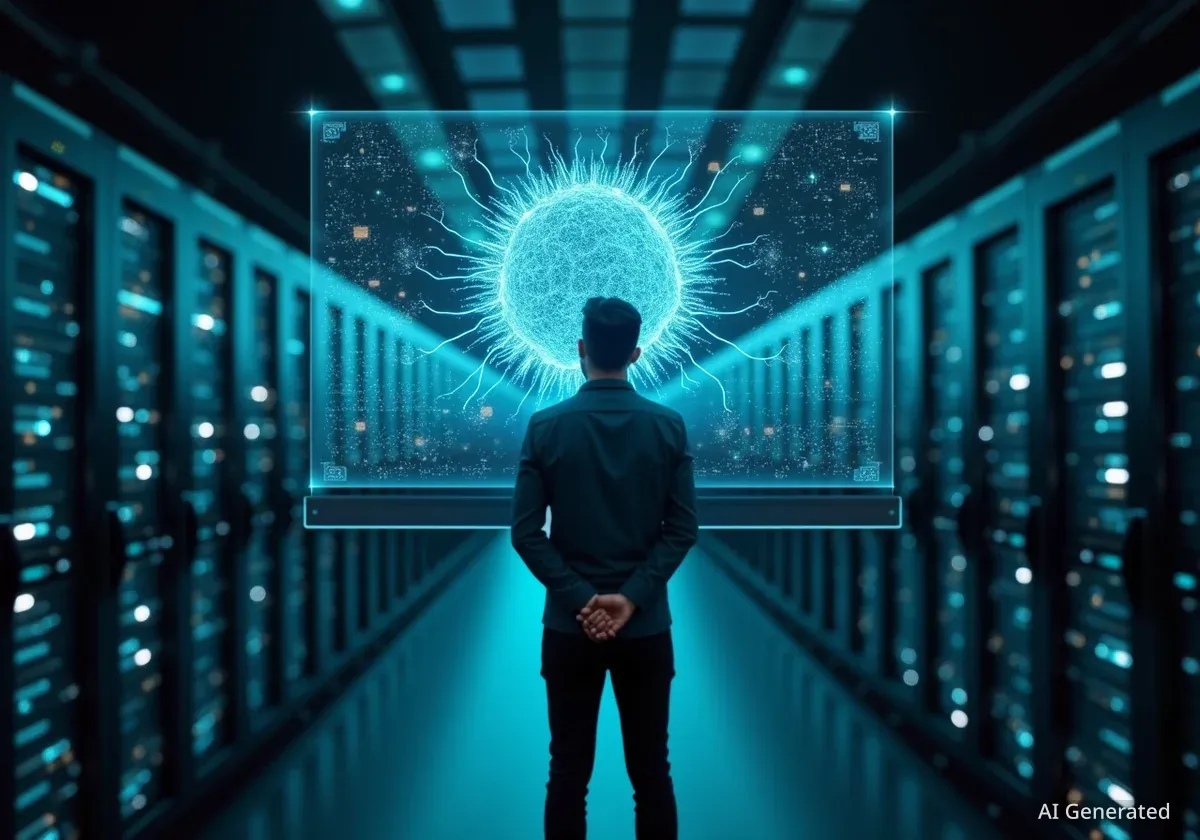The Internet Computer blockchain is intensifying its strategy to become the leading platform for artificial intelligence applications that run entirely on-chain. Dominic Williams, founder of the Dfinity Foundation which develops the project, suggests this could lead to a future where AI, rather than human developers, creates and manages software.
Williams believes that while cryptocurrency markets are currently driven by speculation and liquidity, the underlying technology will eventually determine value. He argues that the technological advancements of the Internet Computer (ICP) are not yet reflected in its market price.
Key Takeaways
- Internet Computer (ICP) is positioning itself as the primary blockchain for hosting and running AI models directly on-chain.
- Founder Dominic Williams envisions a future where AI builds applications based on user descriptions, replacing traditional developers.
- ICP has already demonstrated neural networks running as smart contracts for tasks like image and facial recognition.
- The project's token price (ICP) has not yet seen sustained growth based on these technological developments, often following broader market trends.
Pioneering On-Chain Artificial Intelligence
The Internet Computer project began demonstrating its capabilities in April of last year by running neural networks as smart contracts. According to Williams, these initial tests included image classification and later, facial recognition models. While these models are simpler than the large language models (LLMs) that power tools like ChatGPT, they served as a critical proof of concept.
This demonstration showed that AI could operate natively on a blockchain. Williams emphasized that this capability sets Internet Computer apart from other projects discussing "decentralized AI." Many other platforms rely on off-chain infrastructure, such as Amazon Web Services (AWS), to perform AI computations, using the blockchain primarily for verification or settlement.
On-Chain vs. Off-Chain AI
Most "AI crypto" projects use off-chain servers for the heavy computational work of running AI models. The blockchain is then used to record the results or manage payments. Internet Computer's approach is to have the entire AI model and its execution happen directly within its blockchain environment, which it claims offers greater security and decentralization.
ICP's goal is to integrate the complete AI development and execution process on-chain. This approach avoids dependencies on centralized cloud providers and aims to create a more resilient and transparent ecosystem for AI applications.
The Vision of a "Self-Writing Internet"
Williams describes the ultimate goal as creating a "self-writing internet." In this system, a user could describe the application they need, and an AI would instantly generate the code and deploy it as a functional application hosted directly on the Internet Computer network.
"AI is developing these apps hundreds of times faster than humans could," Williams stated. "And because there are no system admins standing by, you need the guardrails only blockchain can provide."
This vision reframes the role of a blockchain from a simple ledger for financial transactions to a complete computational environment for AI-generated software. The core idea is that AI will automate much of the current software development lifecycle, including coding, database management, and server maintenance.
Removing User Friction with Reverse Gas
A key feature enabling this vision is ICP's "reverse gas" model. In most blockchains, users must pay a transaction fee (gas) to interact with an application. On Internet Computer, developers pre-pay for the computational costs of their applications.
The "reverse gas" model means end-users can interact with applications on the Internet Computer without needing to own cryptocurrency or pay transaction fees, similar to how they use traditional web applications.
This model removes a significant barrier to entry for mainstream users and allows applications to function more like conventional web services. According to Williams, it eliminates the need for complex infrastructure like firewalls and database migrations that are common in traditional web development.
Early Use Cases and Potential
The potential of this AI-driven development model has been explored in early hackathons. Williams highlighted several projects built by non-technical users who used AI on the ICP platform.
Examples of these user-generated applications include:
- A platform for crowdsourcing and mapping the location of potholes in a city.
- A tool designed to help users generate legal documents such as wills and health directives.
The long-term vision is for millions of such customized tools to be created. This could empower entrepreneurs, small businesses, and non-profit organizations to build software tailored to their specific needs without requiring technical expertise or hiring a development team. In this model, users might pay for services with traditional currency, while the underlying blockchain mechanics remain in the background.
Market Performance and Future Outlook
Despite these technological advancements, the ICP token has not experienced sustained price momentum directly correlated with these developments. The token saw a brief rally when AI integrations were first announced but has since tended to trade in line with the sentiment of the broader cryptocurrency market.
Williams acknowledges this disconnect between the project's progress and its market valuation. However, he remains confident that the market will eventually recognize the platform's unique capabilities.
"In the long run, markets begin to reflect realities on the ground," he said. "But as yet you’re not seeing what’s happening with Internet Computer reflected in ICP’s price."
He predicts that this recognition could happen soon, positioning ICP as a direct competitor to traditional Web2 technology stacks. The true impact, he believes, will be felt when users can simply describe an application to an AI and see it instantly appear and function on the web.
"This could be the first time Web3 actually outcompetes Web2 technologically, without a token incentive in sight," Williams concluded. "The shock will be when people realize they can just talk to an AI, and a blockchain app appears at a URL."





